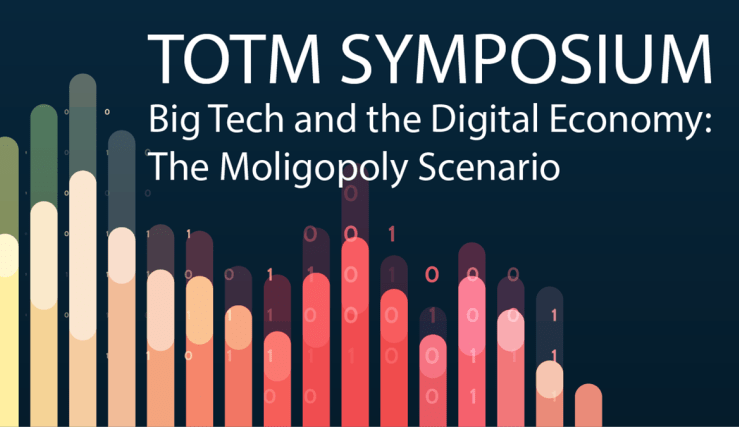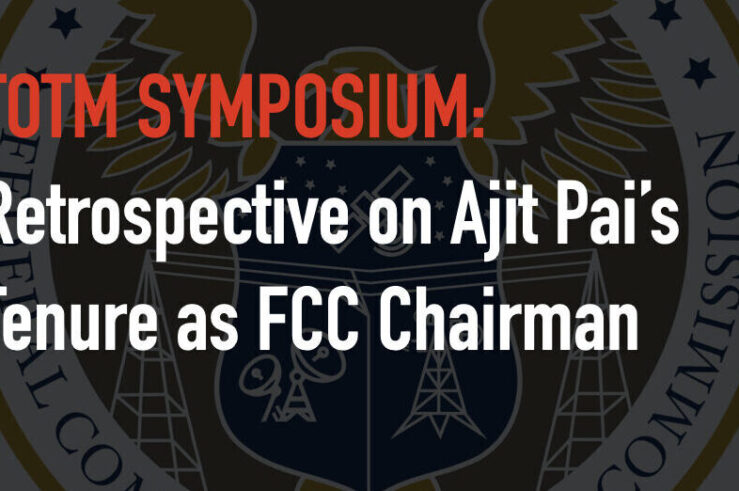Showing archive for: “News & Social Media”
Antitrust Statutorification
A lot of water has gone under the bridge since my book was published last year. To close this symposium, I thought I would discuss the new phase of antirust statutorification taking place before our eyes. In the United States, Congress is working on five antitrust bills that propose to subject platforms to stringent obligations, ... Antitrust Statutorification
Going Back to Antitrust Basics
Advocates of legislative action to “reform” antitrust law have already pointed to the U.S. District Court for the District of Columbia’s dismissal of the state attorneys general’s case and the “conditional” dismissal of the Federal Trade Commission’s case against Facebook as evidence that federal antitrust case law is lax and demands correction. In fact, the ... Going Back to Antitrust Basics
An L&E Defense of the First Amendment’s Protection of Private Ordering
In his recent concurrence in Biden v. Knight, Justice Clarence Thomas sketched a roadmap for how to regulate social-media platforms. The animating factor for Thomas, much like for other conservatives, appears to be a sense that Big Tech has exhibited anti-conservative bias in its moderation decisions, most prominently by excluding former President Donald Trump from ... An L&E Defense of the First Amendment’s Protection of Private Ordering
The FTC Did Not ‘Fumble the Future’ in Its Google Search Investigation
Politico has released a cache of confidential Federal Trade Commission (FTC) documents in connection with a series of articles on the commission’s antitrust probe into Google Search a decade ago. The headline of the first piece in the series argues the FTC “fumbled the future” by failing to follow through on staff recommendations to pursue ... The FTC Did Not ‘Fumble the Future’ in Its Google Search Investigation
Committee Prepares to Grill Tech CEOS, but It Is the First Amendment That Could Get Torched
In what has become regularly scheduled programming on Capitol Hill, Facebook CEO Mark Zuckerberg, Twitter CEO Jack Dorsey, and Google CEO Sundar Pichai will be subject to yet another round of congressional grilling—this time, about the platforms’ content-moderation policies—during a March 25 joint hearing of two subcommittees of the House Energy and Commerce Committee. The ... Committee Prepares to Grill Tech CEOS, but It Is the First Amendment That Could Get Torched
Congress Should Not Legalize a News Media Cartel
Amazingly enough, at a time when legislative proposals for new antitrust restrictions are rapidly multiplying—see the Competition and Antitrust Law Enforcement Reform Act (CALERA), for example—Congress simultaneously is seriously considering granting antitrust immunity to a price-fixing cartel among members of the newsmedia. This would thereby authorize what the late Justice Antonin Scalia termed “the supreme ... Congress Should Not Legalize a News Media Cartel
Ajit Pai Brought the FCC’s Media Ownership Rules into the Modern Age
I’m delighted to add my comments to the chorus of voices honoring Ajit Pai’s remarkable tenure at the Federal Communications Commission. I’ve known Ajit longer than most. We were classmates in law school … let’s just say “many” years ago. Among the other symposium contributors I know of only one—fellow classmate, Tom Nachbar—who can make ... Ajit Pai Brought the FCC’s Media Ownership Rules into the Modern Age
Introductory Post: Retrospective on Ajit Pai’s Tenure as FCC Chairman
Ajit Pai will step down from his position as chairman of the Federal Communications Commission (FCC) effective Jan. 20. Beginning Jan. 15, Truth on the Market will host a symposium exploring Pai’s tenure, with contributions from a range of scholars and practitioners. As we ponder the changes to FCC policy that may arise with the ... Introductory Post: Retrospective on Ajit Pai’s Tenure as FCC Chairman
The Antitrust Prohibition of Favoritism, or the Imposition of Corporate Selflessness
It is my endeavor to scrutinize the questionable assessment articulated against default settings in the U.S. Justice Department’s lawsuit against Google. Default, I will argue, is no antitrust fault. Default in the Google case drastically differs from default referred to in the Microsoft case. In Part I, I argue the comparison is odious. Furthermore, in ... The Antitrust Prohibition of Favoritism, or the Imposition of Corporate Selflessness
Facebook and the Pros and Cons of Ex Post Merger Reviews
The Federal Trade Commission and 46 state attorneys general (along with the District of Columbia and the Territory of Guam) filed their long-awaited complaints against Facebook Dec. 9. The crux of the arguments in both lawsuits is that Facebook pursued a series of acquisitions over the past decade that aimed to cement its prominent position ... Facebook and the Pros and Cons of Ex Post Merger Reviews
Commentary: In the race for a COVID-19 vaccine, how do we balance risk and safety?
(Ed. Note: the following is an excerpt from a piece published by the Chicago Tribune on Oct. 16, 2020. Click here to read the full piece) No matter your Twitter feed, “vaccines have been one of the greatest public health tools to prevent disease,” as The New York Times explained in January… Many are terrified ... Commentary: In the race for a COVID-19 vaccine, how do we balance risk and safety?
It’s Not So Simple Who Owns “Your” Data
What kind of regulation? Treating digital platforms like public utilities won’t work, Petit argues, because the product is multidimensional and competition takes place on multiple margins (the larger theme of the book): “there is a plausible chance that increased competition in digital markets will lead to a race to the bottom, in which price competition ... It’s Not So Simple Who Owns “Your” Data













